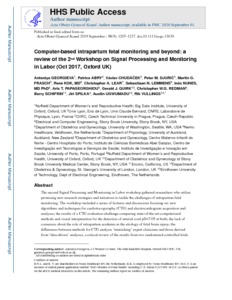Georgieva, A;
Abry, P;
Chudáček, V;
Djurić, PM;
Frasch, MG;
Kok, R;
Lear, CA;
Lemmens, SN;
Nunes, I;
Papageorghiou, AT;
et al.
Georgieva, A; Abry, P; Chudáček, V; Djurić, PM; Frasch, MG; Kok, R; Lear, CA; Lemmens, SN; Nunes, I; Papageorghiou, AT; Quirk, GJ; Redman, CWG; Schifrin, B; Spilka, J; Ugwumadu, A; Vullings, R
(2019)
Computer-based intrapartum fetal monitoring and beyond: A review of the 2nd Workshop on Signal Processing and Monitoring in Labor (October 2017, Oxford, UK).
Acta Obstet Gynecol Scand, 98 (9).
pp. 1207-1217.
ISSN 1600-0412
https://doi.org/10.1111/aogs.13639
SGUL Authors: Papageorghiou, Aris
![[img]](https://openaccess.sgul.ac.uk/112627/1.hassmallThumbnailVersion/nihms-1029417.pdf)  Preview |
|
PDF
Accepted Version
Available under License ["licenses_description_publisher" not defined].
Download (513kB)
| Preview
|
Abstract
The second Signal Processing and Monitoring in Labor workshop gathered researchers who utilize promising new research strategies and initiatives to tackle the challenges of intrapartum fetal monitoring. The workshop included a series of lectures and discussions focusing on: new algorithms and techniques for cardiotocogoraphy (CTG) and electrocardiogram acquisition and analyses; the results of a CTG evaluation challenge comparing state-of-the-art computerized methods and visual interpretation for the detection of arterial cord pH <7.05 at birth; the lack of consensus about the role of intrapartum acidemia in the etiology of fetal brain injury; the differences between methods for CTG analysis "mimicking" expert clinicians and those derived from "data-driven" analyses; a critical review of the results from two randomized controlled trials testing the former in clinical practice; and relevant insights from modern physiology-based studies. We concluded that the automated algorithms performed comparably to each other and to clinical assessment of the CTG. However, the sensitivity and specificity urgently need to be improved (both computerized and visual assessment). Data-driven CTG evaluation requires further work with large multicenter datasets based on well-defined labor outcomes. And before first tests in the clinic, there are important lessons to be learnt from clinical trials that tested automated algorithms mimicking expert CTG interpretation. In addition, transabdominal fetal electrocardiogram monitoring provides reliable CTG traces and variability estimates; and fetal electrocardiogram waveform analysis is subject to promising new research. There is a clear need for close collaboration between computing and clinical experts. We believe that progress will be possible with multidisciplinary collaborative research.
| Item Type: |
Article
|
| Additional Information: |
This is the peer reviewed version of the following article: Georgieva, A, Abry, P, Chudáček, V, et al. Computer‐based intrapartum fetal monitoring and beyond: A review of the 2nd Workshop on Signal Processing and Monitoring in Labor (October 2017, Oxford, UK). Acta Obstet Gynecol Scand. 2019; 98: 1207‐ 1217, which has been published in final form at https://doi.org/10.1111/aogs.13639. This article may be used for non-commercial purposes in accordance with Wiley Terms and Conditions for Use of Self-Archived Versions. |
| Keywords: |
artificial intelligence, cardiotocography, electronic fetal monitoring, health data, hypoxic-ischemic encephalopathy, intrapartum care, sensitivity, specificity, Acidosis, Algorithms, Cardiotocography, Electrocardiography, Female, Fetal Monitoring, Humans, Pregnancy, Prenatal Diagnosis, Signal Processing, Computer-Assisted, United Kingdom, Humans, Acidosis, Cardiotocography, Electrocardiography, Fetal Monitoring, Prenatal Diagnosis, Pregnancy, Algorithms, Signal Processing, Computer-Assisted, Female, United Kingdom, artificial intelligence, cardiotocography, electronic fetal monitoring, health data, hypoxic-ischemic encephalopathy, intrapartum care, sensitivity, specificity, artificial intelligence, cardiotocography, electronic fetal monitoring, health data, hypoxic-ischemic encephalopathy, intrapartum care, sensitivity, specificity, 1114 Paediatrics and Reproductive Medicine, 1117 Public Health and Health Services, Obstetrics & Reproductive Medicine |
| SGUL Research Institute / Research Centre: |
Academic Structure > Institute of Medical, Biomedical and Allied Health Education (IMBE)
Academic Structure > Institute of Medical, Biomedical and Allied Health Education (IMBE) > Centre for Clinical Education (INMECE ) |
| Journal or Publication Title: |
Acta Obstet Gynecol Scand |
| ISSN: |
1600-0412 |
| Language: |
eng |
| Publisher License: |
Publisher's own licence |
| Projects: |
|
| PubMed ID: |
31081113 |
| Web of Science ID: |
WOS:000484377700017 |
| Dates: |
| Date |
Event |
| 2019-08-25 |
Published |
| 2019-06-18 |
Published Online |
| 2019-05-08 |
Accepted |
|
 |
Go to PubMed abstract |
| URI: |
https://openaccess.sgul.ac.uk/id/eprint/112627 |
| Publisher's version: |
https://doi.org/10.1111/aogs.13639 |
Statistics
Item downloaded times since 24 Nov 2020.
Actions (login required)
 |
Edit Item |



